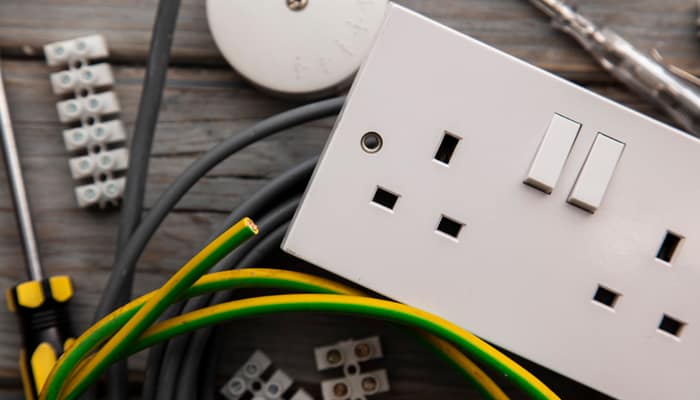Time is running out for landlords who have not completed the Electrical Installation Condition Report – the latest government legislation designed to protect tenant safety. The new legal requirement starting next month is a key part of electrical safety measures.
Any landlord who has not had the new electrical safety inspection carried out in their properties by 1st April faces a hefty fine of up to £30,000. The law changed last year and all new tenancies in England required an Electrical Installation Condition Report from July 2020.

© Ink Drop / Shutterstock.com
Now, from 1st April, the certificate applies to all existing tenancies too. Any landlord who has not had an EICR check should do so as soon as possible, as the tenant needs to have a copy of the report within 28 days. The report must also be available to supply to the local authority when required.
Does the EICR apply UK-wide?
In Scotland, it is mandatory for landlords to have an Electrical Installation Condition Report completed on electrical installations, fixtures and fittings in their rental properties under the Housing (Scotland) Act 2014.
In Wales, an EICR is not yet a legal requirement. However, the report ensures your rental property is safe, giving both the landlord and tenants peace of mind. Some local authorities require an electrical condition report before they will licence a rental property. In addition, some insurers in Wales require an EICR check before they will provide rental properties with the appropriate cover.
Similarly, in Northern Ireland, the EICR is not yet mandatory. However, it has been widely reported that the checks are set to become law in Wales and Northern Ireland too, largely due to lobbying by campaign groups such as Electrical Safety First.
What are the new safety checks?
Every residential property landlord, whether with one flat or a whole portfolio of houses, must have electrical safety checks carried out by 1st April.
A typical report usually costs between £100 and £300, depending on the size of the property and how long it takes to complete the check. Once the inspection has been completed and the property is deemed safe, a further inspection must be carried out every five years. The checks must be done by a qualified professional electrician, who assesses the sockets, switches and wires. The report does not cover appliances.
Although not a requirement by law, the landlord can also have a Portable Appliance Test carried out on the electrical appliances that are included within the property, such as the cooker, for example. However, it is the tenants’ responsibility to ensure the safety of their own appliances.
EICR tests during lockdown
Electricians are permitted to work under the current lockdown rules, so it should be possible for a landlord to arrange the EICR before 1st April. Electricians must adhere to the current safety guidelines with regard to Covid-19.
Electricians are considered keyworkers and as such can carry out essential maintenance and repair work in residential properties, including the safety reports. The government advises carrying out a risk assessment if tenants are in a higher-risk category due to existing health conditions.
Regardless of the lockdown, landlords must make every effort to arrange the EICR checks, or they will fall foul of the law and incur a fine. The April 1st deadline is fast approaching and landlords who leave the inspection until the last minute will find it difficult to carry out any repairs, should they be needed, in order for the electrician to issue the safety certificate.
The pandemic also means there are fewer contractors available, as many haven’t been working during the lockdown, so finding one to test several properties in a short time-scale may be difficult.
Tenants’ consent
Another issue that landlords face is obtaining tenants’ consent for an electrician to enter the property. Some tenants are understandably worried at the prospect of a stranger entering their home – particularly an electrician who may have been in hundreds of other homes during the lockdown.
If the tenant refuses access, the landlord should keep a written record of their attempts to enter the property for the inspection. It is advisable to contact the tenant by text, messenger or email, so there is a documented record of the landlord’s efforts.
In the event of the local authority demanding to see the safety certificates, the landlord can show that all reasonable efforts have been made to gain access and comply with the law.
Other safety checks
As well as electrical safety checks, there’s a whole raft of legislation that landlords must comply with before they rent out a property, including annual gas safety checks.
Any rented home must be fit for human habitation and free from hazards. For example, if a property has a severe damp problem, lacks natural light, has a layout that could be dangerous, lacks adequate ventilation or doesn’t have a hot or cold water supply, it could be deemed unfit for purpose.
If landlords fail to adhere to the new electrical safety laws before 1st April, local authorities are empowered to fine them up to £5,000 for a first offence. Further offences could lead to fines of up to £30,000 for non-compliance.
If you’re a landlord looking to ensure your rental properties are in good shape for tenants, choose the latest furniture packages from Furniture Pack Solutions. We can kit out professional and student HMOs, the buy-to-let market and serviced accommodation.
Give us a call on 0800 781 9427 for further details of our products and services – nationwide delivery and set up available!
